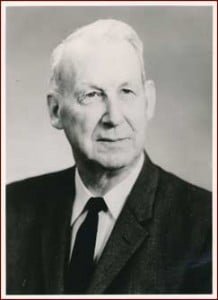November 7: John M. L. Young
September 5: C. Darby Fulton
A Christian Statesman
Charles Darby Fulton was like many other conservative Presbyterians who chose to stay with the mother church rather than leave to join the newly formed denomination as it took a stand against modernism and apostasy. Their reasons for staying may have been varied, but conservatives like Fulton in many respects stayed for the tougher fight, for their numbers were even fewer after the exodus.
There is however something unique about the Rev. C. Darby Fulton that makes you want to know more about the man. He was widely typified as a Christian statesman. One way in which he demonstrated that quality of character was in the fact that, while he did not choose to come into the Presbyterian Church in America at its formation in 1973, he nonetheless was quite willing to bring a message during the PCA’s first General Assembly. Some conservatives who chose not to come into the PCA ignored or even opposed the new denomination. Darby Fulton was different, and that difference is part of what marks him out as a true Christian statesman. It’s part of what makes you want to know more about the true character of the man.
Charles Darby Fulton was born on September 5, 1892, in Kobe, Japan. His parents, the Rev. Samuel Peter Fulton [1865-1938] and Rachel Hoge Peck Fulton, were missionaries sent out by the Southern Presbyterian Church.
Darby Fulton was educated at the Presbyterian College of South Carolina, graduating there with the B.A. degree in 1911, and then earning an M.A. from the University of South Carolina in 1914 [note his thesis topic, in the blbiiography below] before turning his attention to preparation for the ministry at Columbia Theological Seminary. Graduating from Columbia in 1915, he lastly attended Princeton Theological Seminary, and there earned the STB degree n 1916.
Rev. Fulton was ordained on June 25, 1915 by the Presbytery of Enoree [PCUS]. During the time that he was attending Princeton, he transferred his ministerial credentials to the PCUSA, and supported himself by serving the Glassboro and Bunker Hill churches, 1916-1917. Then upon graduation from Princeton, he was received back into Enoree Presbytery and the PCUS as he answered a call to missions work. It was at about this time that Rev. Fulton married Nannie Paul Ravenel, of Spartanburg, South Carolina, in October of 1917.
Departing for the PCUS operated Japan Mission, the Fultons served there from 1918 until 1925. Thereafter Rev. Fulton served as Field Secretary, 1925-32, and then as Executive Secretary, 1932-61, for the PCUS Board of Foreign Missions.
Dr. Fulton served as a professor at his alma mater, Columbia Theological Seminary, from 1962 to 1965, and on September 1, 1965, was entered on the rolls of Presbytery as honorably retired. During his lifetime, he had received a number of honors, including having served as the Moderator of General Assembly [PCUS] in 1948. The Presbyterian College of South Carolina awarded him the Doctor of Divinity degree in 1924 and he received the LL.D. degree from King College in 1952. Following his retirement, the Rev. Dr. C. Darby Fulton lived another twelve years, and he died on May 27, 1977, at the age of 84, while residing in Nashville, Tennessee. Prior to his death, he had established a fund to assist the Kobe Theological Seminary in Japan.
Partial Bibliography:
1914 – Financial Condition and Its Relation to Character. M.A. thesis at the University of South Carolina.
1938 – Star in the East
1946 – Now is the Time
1949 – Report on China.
1959 – Lectures: Series of three lectures delivered before the Synod of Virginia at Massanetta Springs, June 29-30, 1959.
1959 – Missions: Our philosophy, our program, contemporary problems (1959)
1966 – “Baptism in Reformation Perspective,” in One Race, One Gospel, One Task: World Congress on Evangelism (1966)
1973 – “The Excellency of the Knowledge of Christ,” in Addresses delivered during the First General Assembly of the National Presbyterian Church. Montgomery, AL: The Office of Administration, 1973. pp. 32-34.
Undated – “The Gospel is Relevant. Weaverville, NC: The Presbyterian Journal, n.d. Tract, 12 p.
Words to Live By:
For this section today, we would like to provide here the text of Rev. Fulton’s address on the occasion of the First General Assembly of the Presbyterian Church in America:
The Excellency of the Knowledge of Christ, by C. Darby Fulton [Text: Philippians 3:7-14]
Every life has a key word. With some it is money; with others, pleasure; with still others, fame. With Alexander the Great it was conquest; with Napoleon, France; with Edison, science; with Paul, it was Christ.
Paul interpreted every phase of his life in its relation to Christ. When he rejoiced, it was in Christ; he gloried in Christ; he conquered in Christ; he was strong in Christ; and he took pleasure in weaknesses, in injuries, in necessities, in persecutions and distresses for Christ’s sake. For him, to live was Christ.

